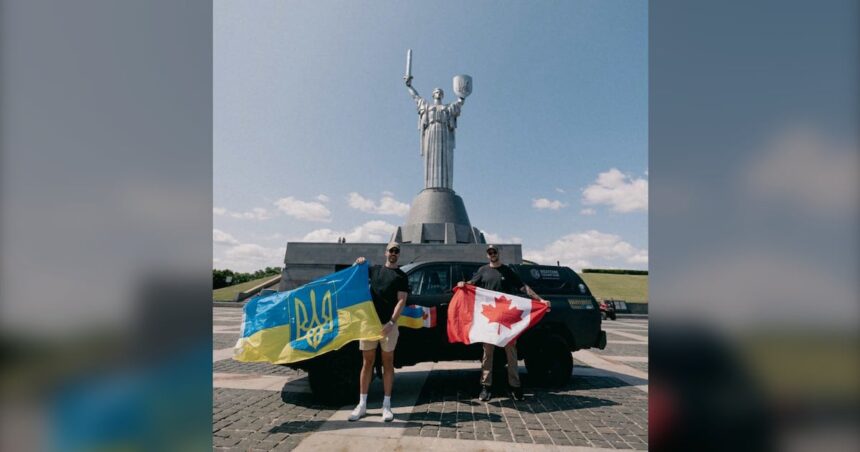In a remarkable display of international solidarity, a Calgary resident has embarked on what can only be described as the road trip of a lifetime—delivering a much-needed military vehicle directly to Ukrainian forces fighting on the frontlines of Europe’s largest land war since World War II.
“Let’s just do it,” was the simple yet powerful response from Calgarian Mike Savaryn when his Ukrainian-American friend Roman Korol approached him with the audacious plan to personally transport a tactical vehicle across Europe to aid Ukraine’s defense efforts.
The journey began in Germany, where the pair took possession of a refurbished British military Saxon—an armored personnel carrier that will now serve Ukrainian defenders. While most aid follows traditional channels through government or large organizational efforts, their grassroots initiative represents a direct line of support from North American citizens to Ukrainian troops.
“There’s something profound about physically bringing this vehicle yourself,” Savaryn told CO24 in an exclusive interview. “You can donate money, and that’s crucial, but actually driving this vehicle through Europe knowing it will protect Ukrainian lives next week—that connection is irreplaceable.”
The pair’s 2,500-kilometer trek took them through five European countries, navigating complex border procedures, mechanical challenges, and the logistical hurdles of moving military equipment through a continent on edge. Their Saxon, affectionately nicknamed “The Bison,” traveled at a modest 60 km/h maximum speed, turning what would normally be a three-day journey into a week-long expedition.
The initiative was coordinated with Canada Ukraine Foundation, which has facilitated the delivery of numerous vehicles and essential supplies to Ukraine since Russia’s full-scale invasion began in February 2022. To date, Canadians have contributed over $50 million in humanitarian and military aid through various channels, according to World News tracking efforts.
“What makes this effort remarkable is that it represents citizen diplomacy at its finest,” said Dr. Larissa Kowalchuk, an expert in Eastern European affairs at the University of Toronto. “While governments negotiate formal support packages, individuals like Savaryn are creating direct connections between Canadian communities and Ukrainian defenders.”
For Savaryn, whose grandparents emigrated from Ukraine to Canada in the 1940s, the mission carries personal significance. “My family found safety in Canada when Ukraine faced historical threats. Now Ukraine faces existential danger again, and I couldn’t simply watch from afar,” he explained.
The Saxon vehicle they delivered will likely be deployed near Kharkiv or Zaporizhzhia, regions experiencing intense military activity. Military experts note that these armored personnel carriers provide crucial protection for medics and rescue operations, potentially saving dozens of lives in high-risk zones.
As Canada continues navigating its role in supporting Ukraine while managing domestic priorities, individuals like Savaryn raise important questions about citizen involvement in international conflicts. As governments deliberate over military aid packages and diplomatic solutions, what responsibility do individual citizens bear in responding to humanitarian crises abroad? And how might these person-to-person connections reshape our understanding of international solidarity in an increasingly complex global landscape?
























